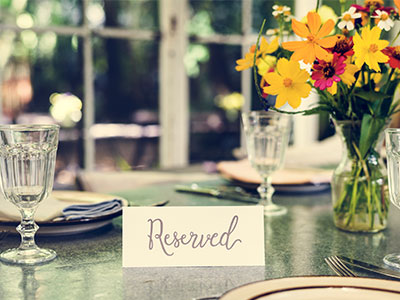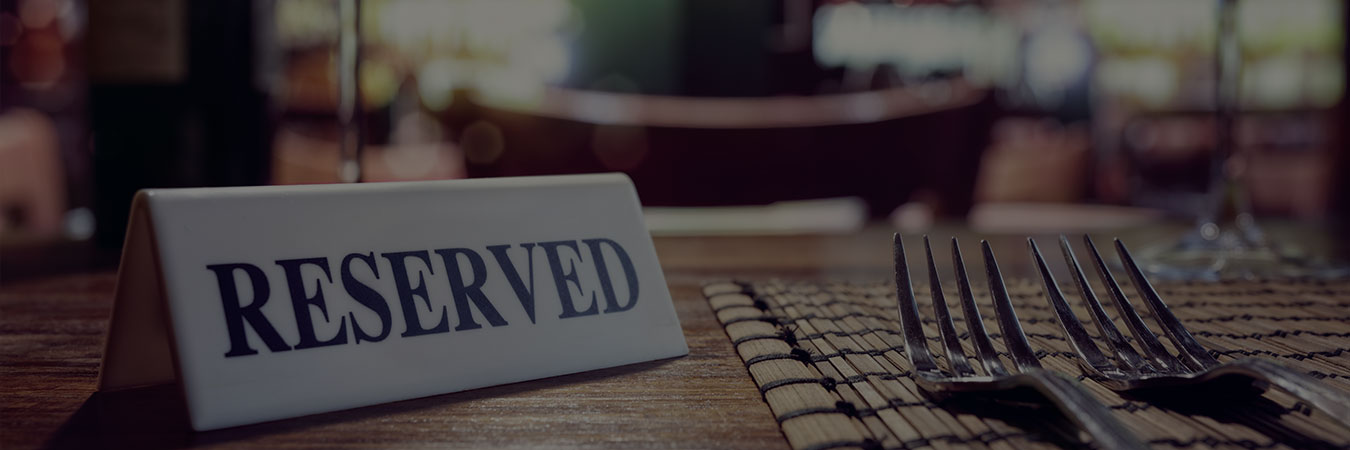How restaurant reservation systems can help in improving dining experience during Covid restrictions
One of the industries badly hit by COVID-19 pandemic is the restaurant industry. The pandemic had made most of the restaurants to close their operations. A few of them had managed to provide take-away services, but the sales were low like never before. However, now the situation is getting better, restaurants are opening with their full capacity followed by some restrictions. Here, you can know more about this scenario, it’s impact, and how technology can be used to handle the situation better.
Restrictions on restaurants
Restaurants in Dubai have begun to serve customers in their premises. Across the UAE, restrictions are eased helping the citizens get back to normal life.
The age specific restrictions are still stopping families to go out and shop or dine together. Especially if the restaurant is operating within the mall.
But there are a few restaurants that allow entry to the customers of every age and serve them with a total dine-in experience. These restaurants are serving customers below 12 and above 60.
Last month, two government authorities of the UAE issued regulations emphasizing the restrictions on the entry of the specific age group as to mass, restaurants or any other public gathering place like super markets. These regulations are applicable across emirates.
How the restaurant industry is going to change after COVID.
For now, the UAE is following all the restrictions and precautionary measures made mandatory by the government authorities. However, even after the pandemic gets over, things will not be even closer to what they used to be before COVID-19.
The novel Coronavirus and its global impact will change the restaurant industry majorly. Restaurants will have to operate more efficiently, have to be more innovative, take help of technological assistance and adjust to the new customer expectations. Less use of paper, advance reservation system to avoid crowds in front of the restaurant, etc. will be the new normal.
The UAE was doing extremely well in the food & beverages sector. Increasing number of tourists was adding to the growth. Dubai had more per capita restaurants actively running than New York or London. 75% of the restaurant owners we’re expecting moderate growth as per 2018 report of KPMG.
But the pandemic has changed the situation upside down. Many businesses are not sure whether they would survive this crisis. Even those restaurants who are open under restrictions are not able to cover the losses.
A few industry experts imagine the future of dining in the context of social-distancing regulations and mandatory hygiene measures. They think that restaurants will no more offer menus on arrival; customers will be able to place orders from their table through smartphones.
Even if customers wish to divide the bill in a group, they can do it through the app. Madbak by RMAL Hospitality claims to be in the process of developing a contactless payment QR code based menus.
They believe that these technological solutions might look odd now but the future will be more accepting and used to these technologies. It might become a trend.
What about hospitality and the feel of dine-in experience?

Consuming food just for the sake of it or just for the hunger and indulging into a dine-in experience are two different things and the difference between these things will play an important role in the future restructuring of the restaurant industry.
If you look at the last decade, the growth of the food sector revolves around the customers who prefer to socialize and visit public gathering places like malls and who prefer outdoor experiences and social opportunities when they are out. This is exactly where the dine in experience matters. Here, technology can be integrated as seamlessly as possible to optimise the dining experience.
Any occasions where an individual or people visit the food serving joint to celebrate a romantic date or as an exclusive spot to celebrate crucial life happenings, the focus can be kept on the kitchen in terms of technological involvement.
Depending on the theme of the restaurant and the type of crowd it attracts the use of technology will differ. However, Covid-19 surely has increased the importance of the use of technology. The time gap between receiving raw food and other items from the source and serving them on plate has to be reduced and blockchain can be of help in this.
Tracking raw food items, transacting them, knowing their nutritional value, estimating their cooking time and expected delivery time, etc data can be extracted and shared with customers through blockchain. Use of POS systems over a traditional booking and payment corner will soon be a mandatory function.
However, this has to be done in a way that hospitality does not get compromised. Hospitality is about serving an experience rather than a player full of food. Every restaurant will have to find it’s own way to make this happen.
What is a restaurant reservation system?

Dining tables in a restaurant are more than just furniture that accommodates customers. These are the spaces where you meet your friends, go on a date, conduct an interview, invite your family members and celebrate the togetherness. Restaurants have to serve customers in a way that this experience gets optimized and their restaurant becomes a part of their customer’s story.
In order to keep the restaurant organized, increase table turnover, reduce waiting time and provide a memorable dining experience, restaurants have to develop and maintain a reliable and efficient operation system.
How Technology Impacts Reservations
In the beginning, restaurant reservations used to take a lot of time as the manager or the hostess or any other staff of the restaurant had to handle the phone calls, take note of the customer name & time on a piece of paper and act on it. The time spent in the manual reservation of tables could be used in cleaning tables, entertaining in-house customers, and helping other staff.
However, now there is a technology to take care of this. Customers can place an order through a reservation software/platform and the restaurant will get the notification of it. Customers will be shown the availability of the tables, waiting time, menu, etc. in advance on the app itself. This app can be a third party app or the one developed by the restaurant itself.
Why Restaurant Reservations are Beneficial
“Open table,” is a term hated by every restaurant manager. Open Table means an empty seat available in the dining room. When a restaurant charges customers they charge for service, food, utility, place, and more. So if any of the tables is vacant, it is a loss for the restaurant.
In order to earn the best out of the sources and serve people with the best services and the least waiting time, they started taking reservations.
Here are some benefits of restaurant reservations to owners, staff, and visitors.
Better Idea of Occupancy
Whether there will be rush or open tables is a fact unknown to every restaurant. However, accepting reservations gives them an idea of how busy the day might be. In case the reservations are not satisfactory, then a restaurant can have special menus or discount offers to attract more customers and make them spend more money.
Prepare Chefs For a Rush:
If the reservations are positive and the footfall is good, then the manager has to get the Chef ready for the higher quantity of orders and a packed day. Here, the staff has enough time to get ready. Plus the hostess or the manager will know how to manage tables.
Whether there will be rush or open tables is a fact unknown to every restaurant. However, accepting reservations gives them an idea of how busy the day might be. In case the reservations are not satisfactory, then a restaurant can have special menus or discount offers to attract more customers and make them spend more money.
Waiting Time is Under Control
Restaurant reservations not only help the kitchen staff and the owner, but are also important to provide a memorable and comforting dining experience to the customers. A restaurant can keep the table ready a little before the reservation time, so that when the customers (who had made reservations) enter the restaurant they can be ushered right to the table without much ado. How pleasant a dining experience would it be for the customers?
If the reservations are positive and the footfall is good, then the manager has to get the Chef ready for the higher quantity of orders and a packed day. Here, the staff has enough time to get ready. Plus the hostess or the manager will know how to manage tables.
Whether there will be rush or open tables is a fact unknown to every restaurant. However, accepting reservations gives them an idea of how busy the day might be. In case the reservations are not satisfactory, then a restaurant can have special menus or discount offers to attract more customers and make them spend more money.
Third-party reservation platform
Using third party reservation apps is a new trend in the restaurant industry. These mobile friendly applications promote restaurants on their platform, allow customers to book tables and make efforts to reduce the number of open tables in the listed restaurants.
Customers can choose restaurants and book tables using different filters like country, state, city, and restaurant, time, location of the table, etc. Customers can also mention the number of people they want to reserve a table for. However, not every app suits everyone. Hence it is recommended to check the following factors before using any restaurant reservation app.
Calendar.
The app must show the updated calendar to the customers. Customers can book a table anytime throughout the 24 hours hence, the system must stay updated. You do not want to deal with double-booking and cancellation headaches.
User-friendly.
This one is not a head-scratcher. When it comes to technology, everything has to be user-friendly. Your solution has to be easy to use, and must function swiftly.
Customer support.
If you are dealing with customers in any way, testing them well is the basic you can do. Having own customer support would come handy here. Each of your customers’ query, issues and expectations would be dealt with by this customer support system.
Apart from this, you need to make sure that the platform you are using has its own mobile app that you can use from anywhere across the country to book a table. The platform must be flexible and can be integrated with other restaurant management software or social media sites that customers use to book a dine-in experience.
Check the initial cost of partnering with third party platforms and see if the charges and costs are continuous.
Building In-house Online Restaurant Reservations
If a third party reservation platform does not suit your expectations, you can build a business website for your restaurant to facilitate online reservations. In the end, serving customers with the best services matters. Your customers might feel more comfortable and secured to use your business website for reservations than using a third party platform.
You must take care of the following factors to make your website use-worthy and most preferred way of making reservations.
For Customers:
- Allowing 24/7 access.
- Click based services to eliminate the need of making calls.
- Allowing them to review restaurants.
Once the website is ready you can:
- Go for Google restaurant listing
- Click-to-Call approach
Why go for a reservation system?
Increases accuracy:
Noting down reservation details manually would be time consuming and subject to errors. Plus, one might not be available for a call or message by customers when they call to reserve a table. Hence losing on the customers too.
Predictable wait times:
Online reservations keep restaurant staff and chef aware of the food demand, footfall and inventory needs. Plus, managers know how to adjust walk-in customers and reserved tables. This way, the restaurant is ready, walk-in customers are managed better and reserved tables fry the service they expect.
Facilitates reservation reminders:
A smart reservation platform will send reminders to both restaurants and customers so both the parties get ready at the right time.
Saving and managing customer profiles:
Those who reserve tables through online platforms share their details with the platform. These details can be used by the restaurant to treat them with a customized approach. You can share special menus, discounts and offers to them based on their past orders and preference.
Managing the restaurant floor:
Managing the tables, estimating the expected footfall, informing the kitchen of the probable quantity of orders during specific periods of time, etc. and more can be made possible through an online reservation system.
What problems do restaurant workers have when handling reservations?
Every technology has its own advantages and disadvantages. Before you build an online reservation platform, make sure you are aware of its drawbacks too.
Limiting sales potential:
The more preference you give to online reservations, the more you limit the walk-in footfall. This could limit your sales.
The cost of no-shows:
You will always come across those customers who will book in advance and will not show up. Such people will create a gap between demand and supply balance of your restaurant.
Losing customers:
Losing those valued customers who could not reserve the table on time and now do not want to visit the restaurant in fear of waiting-time.


